 1996 Renault Safrane I (B54, facelift 1996) Dimensions, Size & Specs
1996 Renault Safrane I (B54, facelift 1996) Dimensions, Size & SpecsMeasurements of the 1996 Renault Safrane I, engineered for optimal performance and comfort
| Dimensions | |
|---|---|
| Length: | 4768 mm187.7 in15.6 ft |
| Width: | 1816 mm71.5 in6.0 ft |
| Height: | 1435 mm56.5 in4.7 ft |
| Trunk Capacity: | 455 liter16.1 cu ft |
| Trunk Capacity (Max): | 1360 liter48.0 cu ft |
| Weight Specifications | |
| Curb Weight: | 1450-1580 kg3197-3483 lbs |
| Maximal permitted Weight: | 2025-2145 kg4464-4729 lbs |
| Tire Specifications | |
| Rims Sizes: | 15-inch rims:
|
| Tire Sizes: |
|
The Renault Safrane I (B54 facelift 1996) is a sophisticated executive hatchback produced from 1996 to 2000. This generation of the Safrane offers a blend of spaciousness and elegance, characterized by its refined exterior styling updates introduced during the facelift period. Measuring 4768 mm (187.6 inches) in length, 1816 mm (71.5 inches) in width, and 1435 mm (56.5 inches) in height, the Safrane I positions itself comfortably within the executive hatchback class, providing a well-balanced footprint that promotes interior comfort without compromising maneuverability. The curb weight ranges between 1450 kg to 1580 kg (3,197 to 3,484 lbs), while the vehicle’s maximum weight capacity spans from 2025 kg up to 2145 kg (4,463 to 4,729 lbs), accommodating driver, passengers, and cargo efficiently. A notable highlight is its practical luggage space, offering 455 liters (16.1 cubic feet) behind the rear seats, which expands substantially to 1360 liters (48 cubic feet) with the rear seats folded down, catering to diverse cargo needs. The Safrane rides on alloy rims sized 15,6J x 15 and uses tires sized 195/65 R15 or 205/60 R15, ensuring a comfortable and stable driving experience. Overall, the Renault Safrane I facelift stands as a mature and roomy hatchback ideal for those seeking reliable executive class motoring with ample interior and cargo space.
Discover the standout features that make the 1996 Renault Safrane I a leader in its class
Have a question? Please check our knowledgebase first.
The Renault Safrane I (B54, facelift 1996) has a length of 4768 mm (187.6 inches), a width of 1816 mm (71.5 inches), and a height of 1435 mm (56.5 inches). These dimensions make it a relatively large hatchback for its time, providing ample interior space and presence on the road. The dimensions contribute to both comfort for passengers and the car's aerodynamic profile typical of mid-to-late 1990s European sedans and hatchbacks.
The curb weight of the Renault Safrane I (B54, facelift 1996) ranges from 1450 to 1580 kg (3197 to 3483 pounds), depending on trim and equipment level. The maximum permissible weight spans from 2025 to 2145 kg (4463 to 4728 pounds). This weight range allows the Safrane to handle passengers and cargo comfortably while maintaining good driving dynamics and safety margins, reflecting its positioning as a comfortable and well-equipped executive-class hatchback.
The Renault Safrane I facelift model offers a luggage capacity of 455 liters (16.1 cubic feet) with the rear seats in their upright position, which is suitable for everyday shopping or luggage for a couple. When the rear seats are folded down, the luggage capacity expands significantly to 1360 liters (48 cubic feet), making it highly practical for transporting larger items or more luggage on trips, which is a strong attribute of the hatchback body style combined with the vehicle’s size.
The Renault Safrane I (1996 facelift) typically comes with 15-inch rims with sizes 15,6J x 15. The tire sizes standardly fitted to this model are 195/65 R15 and 205/60 R15. These tire and rim sizes are balanced to provide a comfortable ride quality along with good handling characteristics for a car of this category, contributing to stability and ride comfort while helping with overall vehicle aesthetics.
Standard residential garages typically measure around 2400 mm (94.5 inches) wide and 4800 mm (189 inches) deep. The Renault Safrane I facelift measures 1816 mm (71.5 inches) in width and 4768 mm (187.6 inches) in length, which means it fits comfortably within the bounds of a standard one-car garage. There’s enough room on the sides for opening doors without scraping the walls and sufficient length to park safely, making it suitable for typical home garage storage without any special accommodation or modifications.
The Renault Safrane I facelift (1996-2000) retains the core dimensions of its predecessor but features a more modernized design and improved aerodynamics. While the overall length and width remain close to the original Safrane, the facelift refined exterior styling, and possibly improved interior packaging. This generation kept the large hatchback's spacious character while updating features to maintain competitiveness. Typically, the differences are subtle dimension-wise but notable in design, comfort, and equipment rather than size.
In comparison to other executive hatchbacks from the 1990s, such as the Opel Omega or the Saab 9000, the Renault Safrane I facelift holds its own with competitive exterior dimensions (length near 4.77 meters), respectable interior space, and a large luggage capacity with seats folded. Its 455-liter trunk capacity is typically on par or better than many rivals. The Safrane’s hatchback design adds practicality over traditional sedans, making it an attractive option for buyers needing both comfort and cargo versatility in that segment.
While exact ground clearance is not specified here, cars of the Renault Safrane’s class and era generally have a ground clearance around 140-160 mm (5.5-6.3 inches). This moderate clearance ensures comfortable highway driving and urban usability without compromising stability. It allows easy entry and exit, while being high enough to clear speed bumps and typical road irregularities. This balance enhances everyday use for family transportation, even on less-than-perfect road surfaces.
The Renault Safrane I facelift is known for its spacious and comfortable interior, designed to accommodate five passengers with ample legroom and headroom. Its large dimensions translate to roomy front and rear seats, suitable for longer journeys. High-quality materials, ergonomic seating, and an effective climate system further elevate comfort levels. The car also provides practical storage compartments, making it a well-rounded option for families or executives who need both comfort and space.
The 1996 facelift of the Renault Safrane I included refinements to suspension tuning aimed at improving ride comfort and handling stability. Though the fundamental suspension layout remained unchanged, fine-tuning of components helped reduce road noise and vibrations, enhancing the smooth driving experience expected in this class. The suspension is designed to absorb urban road irregularities efficiently while maintaining composure on highways, making the facelift version more refined compared to the pre-facelift Safrane.
Discover similar sized cars.
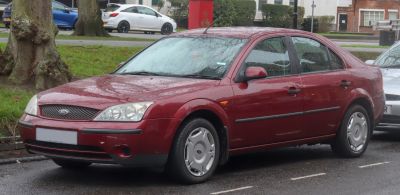
| Production: | 2001-2007 |
|---|---|
| Model Year: | 2001 |
| Length: | 4731 mm186.3 in |
| Width: | 1812 mm71.3 in |
| Height: | 1429 mm56.3 in |
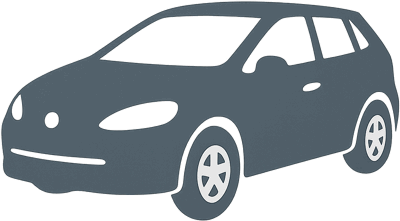
| Production: | 2016-2020 |
|---|---|
| Model Year: | 2016 |
| Length: | 4824 mm189.9 in |
| Width: | 1828 mm72.0 in |
| Height: | 1508 mm59.4 in |
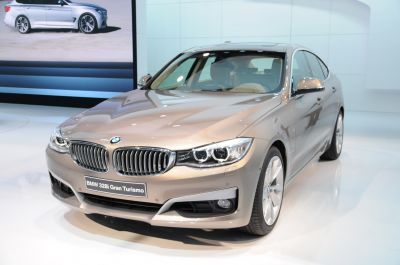
| Production: | 2013-2016 |
|---|---|
| Model Year: | 2013 |
| Length: | 4824 mm189.9 in |
| Width: | 2047 mm80.6 in |
| Height: | 1508 mm59.4 in |
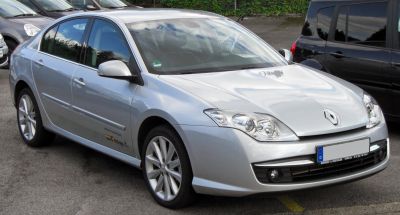
| Production: | 2007-2010 |
|---|---|
| Model Year: | 2007 |
| Length: | 4695-4803 mm184.8-189.1 in |
| Width: | 2060 mm81.1 in |
| Height: | 1445 mm56.9 in |
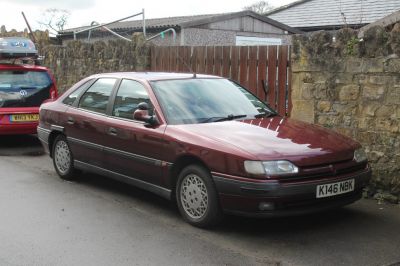
| Production: | 1992-1996 |
|---|---|
| Model Year: | 1992 |
| Length: | 4734-4763 mm186.4-187.5 in |
| Width: | 1790-1818 mm70.5-71.6 in |
| Height: | 1414-1448 mm55.7-57.0 in |
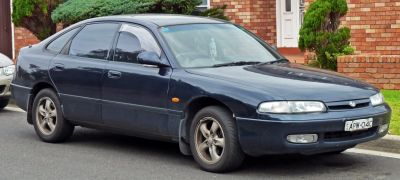
| Production: | 1991-1997 |
|---|---|
| Model Year: | 1992 |
| Length: | 4700 mm185.0 in |
| Width: | 1750 mm68.9 in |
| Height: | 1390 mm54.7 in |
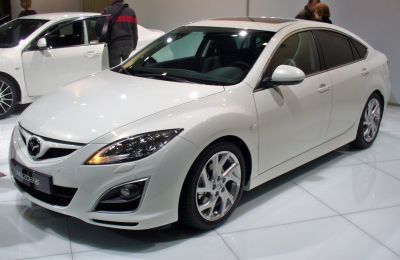
| Production: | 2010-2012 |
|---|---|
| Model Year: | 2011 |
| Length: | 4755-4765 mm187.2-187.6 in |
| Width: | 1795 mm70.7 in |
| Height: | 1440 mm56.7 in |
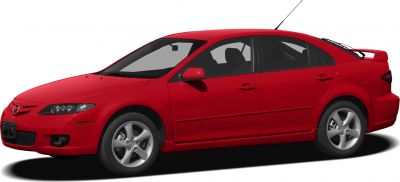
| Production: | 2007-2010 |
|---|---|
| Model Year: | 2008 |
| Length: | 4735-4755 mm186.4-187.2 in |
| Width: | 1795 mm70.7 in |
| Height: | 1440 mm56.7 in |
